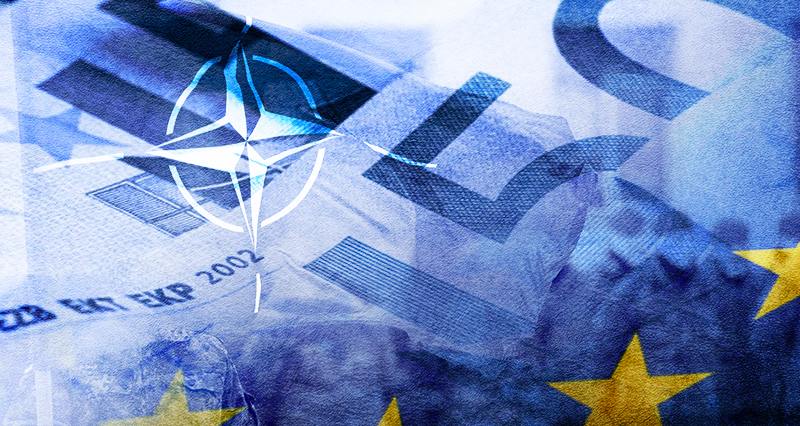Germany sets up military posts just 20 km from the Russian border, while NATO pursues military exercises along Türkiye’s borders.
Germany sets up military posts just 20 km from the Russian border, while NATO pursues military exercises along Türkiye’s borders.
By Deniz Yıldırım
Germany has begun to deploy troops to Lithuania, with the “need to strengthen NATO’s eastern flank”. German Chancellor Friedrich Merz and Defense Minister Boris Pistorius visited the 45th Tank Brigade stationed in Lithuania.
This move marks the first time since the Nazi era that Germany has stationed troops in a foreign country. Following the outbreak of the Russia-Ukraine war, Germany has been increasing its military presence under the banner of countering the so-called “Russian threat”. The number of troops in the brigade is expected to reach 5,000 by the end of 2027.
According to the foreign affairs desk at Berliner Morgenpost, this deployment sends a clear message to Russia: “We’re here”. The comment reads: “Unlike Donald Trump, the German government is not inclined to have a false sense of security through negotiations that Putin seeks to create.”
Lithuanian President Gitanas Nausėda thanked the German troops by speaking German. Commenting on the upcoming joint “Zapad” military exercises between Russia and Belarus scheduled for September, he warned: “Unforeseen events can occur during such drills, and conflicts often erupt in the aftermath of these incidents.”
German troops just 20 km from Belarus border
The headquarters of the German brigade in Lithuania will be established in Rudninkai, near the capital Vilnius. The area is located in southeastern Lithuania, just 20 kilometers from the Belarusian border. On May 16, more than 1,600 paratroopers from the US, Germany, the Netherlands, France, and Italy conducted a large airborne assault drill near Pabrade. The exercise was led by the US Army’s 173rd Airborne Brigade and included around 1,500 soldiers.
“Ukraine can use German weapons to hit Russia”
Chancellor Merz announced that restrictions on the use of long-range weapons delivered to Ukraine have been lifted. He said this is the case not only for German weapons, but also those of the UK and France. He stated this will “allow Kyiv to hit targets inside Russia with no external limits”.
A war by 2029
Germany’s Chief of General Staff, Carsten Breuer, ordered that the German military be fully equipped with weapons and other gear by 2029. A document signed on May 19 outlined that funding for this buildup will come through relaxed fiscal rules, known as the “debt brake”. This means that Germany has now entered an era of “budget for war, cuts for workers.”
Immediate Response 25
Let’s come to Türkiye.
The “Immediate Response 25” exercise was held at Krivolak, North Macedonia’s largest military training ground. Parts of the exercise took place near the port city of Alexandroupoli (Dedeağaç), just 30 kilometers from the Turkish border. Despite being a NATO member, Türkiye was excluded from the operation.
At the opening ceremony, it was announced: “Immediate Response 25 demonstrates multinational live fires conducted with NATO networks, a cyber exercise, water crossing, and CBRNE exercises from May 26–June 9 with over 12,000 participants and hosted in eight countries to include Albania, Bulgaria, Croatia, Greece, Kosovo, Montenegro, North Macedonia, and Slovakia.”
The official goal of the exercise was defined as part of Defender 25”, a large-scale military exercise led by the US Army on the territory of NATO’s southeastern European members. The stated aim is “to enhance readiness and deterrence capabilities among NATO allies and partners.”
North Macedonian General Gjorgoski, who opened the exercise, stated: “For our military, celebrating its fifth year of NATO membership, this exercise is an ideal opportunity for force deployment and training, as well as direct cooperation with allied and partner armies.”
Notably, Türkiye wasn’t in his list of allies.
Türkiye in the south, Russia in the north
Combining the military developments in the north and the south together, we can say that both Türkiye and Russia are on target. Germany is setting up its headquarters just 20 kilometers from the border of Russia’s key ally Belarus, while NATO is conducting exercises just 30 kilometers from Türkiye’s border.
Military exercises are never carried out for the sake of appearances. They are held with the expectation that the next stage may follow.
At a time when the world is watching to see how both Türkiye and Russia will respond to these challenges, a high-level meeting took place between Turkish Foreign Minister Hakan Fidan and Russian President Vladimir Putin. The fact that a foreign minister was received directly by a head of state highlights the seriousness of the situation.
















Leave a Reply